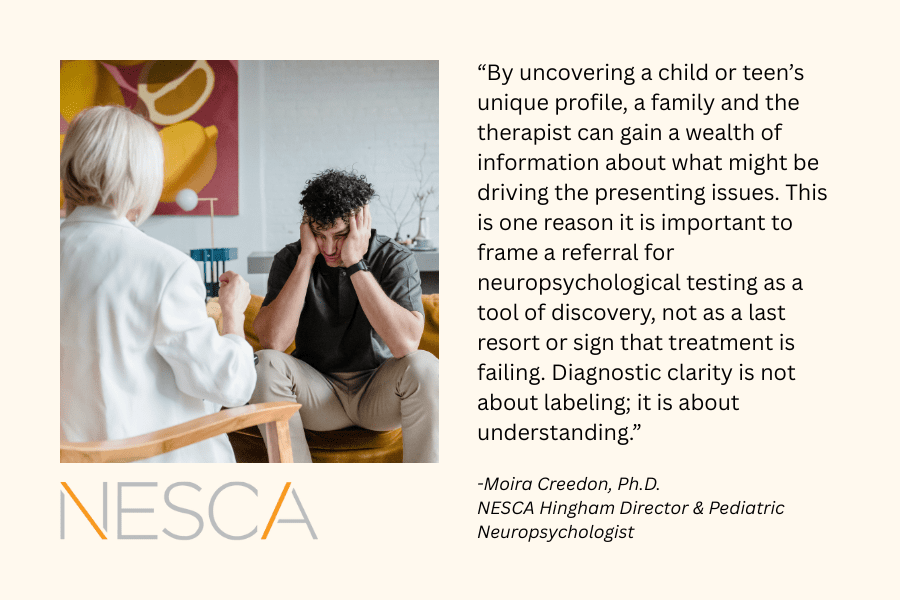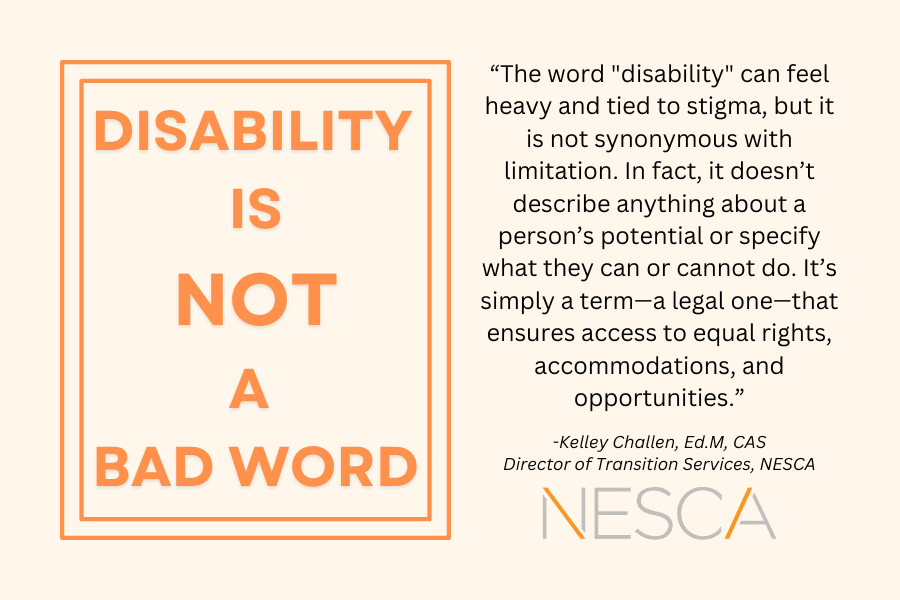
 By: Sean Hyde O’Brien, Psy.D., ABPdN
By: Sean Hyde O’Brien, Psy.D., ABPdN
Pediatric Neuropsychologist, NESCA
Often when a child is struggling at school — whether related to academic, behavioral, or social-emotional functioning — they may be referred for testing by a member of their educational team (often at the parents’ request). Such testing can include psychological, educational, speech-language, occupational, and physical therapy assessments conducted by qualified school personnel, as well as more specialized transition, functional/adaptive behavioral, and autism-related assessments. These evaluations are generally conducted to determine a student’s eligibility for special education services, identify appropriate supports, and establish goals to monitor progress.
In many cases, school-based testing is sufficient to meet the needs of the student and family by facilitating access to services and supports. However, there are situations in which school-based testing may not be sufficient on its own:
Need for a Clinical Diagnosis
School evaluations are designed to determine eligibility for special education services under educational categories (e.g., “Health Impairment,” “Specific Learning Disability,” or “Sensory Impairment”), rather than to establish diagnoses for medical or treatment purposes. When a formal diagnosis is needed to guide treatment, medication decisions, or access to private insurance-based services, a neuropsychological evaluation may be necessary.
Complex or Co-occurring Issues
Neuropsychological evaluations are designed to integrate information across multiple domains, offering a more comprehensive understanding of the student as a whole.
Disagreement with School Findings
If parents have concerns about the conclusions or recommendations from a school evaluation, they may pursue an Independent Educational Evaluation (IEE) or seek private testing with a neuropsychologist to obtain an additional perspective.
Evaluation of Non-academic Concerns
Concerns such as anxiety, depression, trauma, or family stressors — which can significantly affect learning — may fall outside the primary scope of school-based testing and may be more fully explored through a comprehensive neuropsychological evaluation.
Legal or Eligibility Requirements
Certain services, accommodations, or agencies (such as Social Security Disability benefits, specific therapies, or independent schools) may require documentation or diagnoses from a licensed clinical provider. Neuropsychologists are licensed psychologists with specialized doctoral and post-doctoral training in brain-behavior relationships who can provide this type of documentation when needed.
In summary, school-based testing is often a valuable and important first step in understanding a child’s needs within the educational setting. In some cases, however, a comprehensive neuropsychological evaluation can provide additional insight into a student’s profile as well as medical documentation needed to access a variety of services.
About the Author
Dr. Sean O’Brien has been providing comprehensive neuropsychological evaluations in the Greater Boston area since 2006. He specializes in the assessment of children and adolescents who present with a wide range of developmental conditions, such as Attention-Deficit/Hyperactivity Disorder, Specific Learning Disorder (reading, writing, math), Intellectual Disability, and Autism Spectrum Disorder; as well as children whose cognitive functioning has been impacted by medical, psychiatric, and genetic conditions. He also has extensive experience working with children who were adopted both domestically and internationally.
Boston area since 2006. He specializes in the assessment of children and adolescents who present with a wide range of developmental conditions, such as Attention-Deficit/Hyperactivity Disorder, Specific Learning Disorder (reading, writing, math), Intellectual Disability, and Autism Spectrum Disorder; as well as children whose cognitive functioning has been impacted by medical, psychiatric, and genetic conditions. He also has extensive experience working with children who were adopted both domestically and internationally.
To schedule an appointment with one of NESCA’s neuropsychologists, please complete our online intake form.
NESCA is a pediatric neuropsychology practice and integrative treatment center with offices in Newton, Plainville, and Hingham, Massachusetts; Londonderry, New Hampshire; the greater Burlington, Vermont region; and Coral Gables, Florida, serving clients from infancy through young adulthood and their families. For more information, please email info@nesca-newton.com or call 617-658-9800.



 research and academia for over 30 years. She is a national consultant and speaker on program design and the inclusion of children and adolescents with special needs, especially those diagnosed with Autism Spectrum Disorder (ASD). Prior to joining NESCA, Ms. Lucci was the Principal of the Partners Program/EDCO Collaborative and previously the Program Director and Director of Consultation at MGH/Aspire for 13 years, where she built child, teen and young adult programs and established the 3-Ss (self-awareness, social competency and stress management) as the programming backbone. She also served as director of the Autism Support Center. Ms. Lucci was previously an elementary classroom teacher, special educator, researcher, school psychologist, college professor and director of public schools, a private special education school and an education collaborative.
research and academia for over 30 years. She is a national consultant and speaker on program design and the inclusion of children and adolescents with special needs, especially those diagnosed with Autism Spectrum Disorder (ASD). Prior to joining NESCA, Ms. Lucci was the Principal of the Partners Program/EDCO Collaborative and previously the Program Director and Director of Consultation at MGH/Aspire for 13 years, where she built child, teen and young adult programs and established the 3-Ss (self-awareness, social competency and stress management) as the programming backbone. She also served as director of the Autism Support Center. Ms. Lucci was previously an elementary classroom teacher, special educator, researcher, school psychologist, college professor and director of public schools, a private special education school and an education collaborative.
 is interested in uncovering an individual’s unique pattern of strengths and weaknesses to best formulate a plan for intervention and success. She tailors each assessment to address a range of referral questions, such as developmental disabilities, including Autism Spectrum Disorder, learning disabilities, attention challenges, executive functioning deficits, and social-emotional struggles. She also evaluates college-/grad school-age/adult individuals with developmental issues, such as ASD and ADHD, particularly when there is a diagnostic clarity or accommodation question.
is interested in uncovering an individual’s unique pattern of strengths and weaknesses to best formulate a plan for intervention and success. She tailors each assessment to address a range of referral questions, such as developmental disabilities, including Autism Spectrum Disorder, learning disabilities, attention challenges, executive functioning deficits, and social-emotional struggles. She also evaluates college-/grad school-age/adult individuals with developmental issues, such as ASD and ADHD, particularly when there is a diagnostic clarity or accommodation question.



 attention deficit disorders, communication disorders, intellectual disabilities, and learning disabilities. She particularly enjoys working with children and their families who have concerns regarding an autism spectrum disorder. Dr. Milana has received specialized training on the administration of the Autism Diagnostic Observation Schedule (ADOS).
attention deficit disorders, communication disorders, intellectual disabilities, and learning disabilities. She particularly enjoys working with children and their families who have concerns regarding an autism spectrum disorder. Dr. Milana has received specialized training on the administration of the Autism Diagnostic Observation Schedule (ADOS).


 young adults with diverse developmental and learning abilities. Since 2013, she has served as Director of Transition Services at NESCA, offering individualized transition assessments, planning, consultation, coaching, and program development. She specializes in working with students with complex profiles who may not engage with traditional testing tools or programs. Ms. Challen holds a BA in Psychology and a Minor in Hispanic Studies from The College of William and Mary, along with a Master’s and Certificate of Advanced Graduate Study in Risk and Prevention Counseling from the Harvard Graduate School of Education. She is a member of CEC, DCDT, and COPAA, believing it’s vital for all IEP participants to have accurate information about transition planning. Ms. Challen has also been actively involved in the MA DESE IEP Improvement Project, mentored candidates in UMass Boston’s Transition Leadership Program, and co-authored a chapter in Technology Tools for Students with Autism.
young adults with diverse developmental and learning abilities. Since 2013, she has served as Director of Transition Services at NESCA, offering individualized transition assessments, planning, consultation, coaching, and program development. She specializes in working with students with complex profiles who may not engage with traditional testing tools or programs. Ms. Challen holds a BA in Psychology and a Minor in Hispanic Studies from The College of William and Mary, along with a Master’s and Certificate of Advanced Graduate Study in Risk and Prevention Counseling from the Harvard Graduate School of Education. She is a member of CEC, DCDT, and COPAA, believing it’s vital for all IEP participants to have accurate information about transition planning. Ms. Challen has also been actively involved in the MA DESE IEP Improvement Project, mentored candidates in UMass Boston’s Transition Leadership Program, and co-authored a chapter in Technology Tools for Students with Autism.
Connect with Us